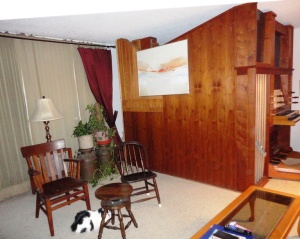Not considering spatial realties we all have in common, that we live on a tiny chunk of stuck-together elements floating around a not-so-impressive star in a not-so-special galaxy in an (apparently) ever-expanding universe, I have a limited view of spatial reality.
When I am in “my space” (materially, not virtually) I stumble around on about 1200 square feet of concrete floor bounded by concrete walls on all sides except one which is 2/3rds floor-to-ceiling windows. Although my space is one large room(1) [footnote and etymology of “room”], it is enough for my needs (it has small spaces walled off for bathroom and kitchen). I pay rent for this loft to a company (probably a multi-national corporation, perhaps headquartered in China or the United Arab Emirates) for the privilege of “clearing my space” (see etymology) in this place.
This space is adequate for me, but I could do with a smaller space. I have a great deal of furniture I never use—a huge roll-top desk, for starters— I inherited from my late partner. I have oodles of stuff I have not used in years.
Roomth is like warmth. One needs a certain amount—not too much, not too little. The main obstacle to my achieving the correct roomth is the pipe organ in my space—eight feet by eight feet by eight feet.
A study of persons living in shelters and other communal settings found that having a private space is more than simply a convenience. These persons (I should think all persons would) explained to the researchers
. . . the importance of having personal and private spaces that were emotionally safe and appropriate. Favorite activities such as listening to music, watching television, and computer games were cited often (2).
That’s not the least bit surprising. Everyone needs personal and private space, and those of us in “developed” countries should be much more grateful than we are that most of us have such space. Perhaps I should distinguish between “personal” and “private” space. Everyone these days thumbs text messages and plays computer games and talks on the phone when and where she pleases—regardless who is nearby. That does not require a private space. One simply assumes any space is one’s personal space, whether or not it is private.
My late ex-wife used to say that one’s possessions expand to fill whatever space one has available. And so they do. I wonder if it’s true that one’s view of the world also expands to fill the mental space one has available.
Wendy Gan, in a recent article about Virginia Woolf’s A Room of One’s Own, describes the domination of “spatial privacy” Woolf was pushing against as
. . . .standard practice for a man; his spaces were set up for solitude but not so for a woman. This was to be challenged. Modernity ushered in not only an increased awareness of spatial politics but also attempts to reformulate a masculine practice of spatial privacy. . . (3)
Whether or not the gender spatial inequality Woolf wrote of still exists, I don’t know (I’ve admitted before I’m not a scholar). However, I’m pretty sure “spatial politics” is very much with us in other ways.
In 1990 I was with a group of academics wandering around Brazil. I suppose “wandering” is hardly the right word because our trip was well planned, and for the most part we were on a rigid schedule going only to predetermined spaces (Amazon River forests managed by botanists, markets in Manaus, a splendid beachfront hotel in Salvador, and carefully managed side trips from our Ipanema Beach hotel in Rio).
We did—once—make a short trip to a favela, ensconced in our bus, following a route the driver and our guides knew to be “safe,” because they knew how to turn the bus around and exit quickly if necessary. I think their concern for our safety was not unwarranted.
In 2003 I was with a delegation from the Fellowship of Reconciliation which was able (in the lull between the Second Intifada and the struggle for dominance between the Palestinian National Authority and Hamas) to tour Gaza, including the Refugee Camp at Rafah. In 2008 I was a member of a group that visited Palestine and Israel headquartered in Bethlehem where we visited the Aida Refugee Camp.
The favela and the refugee camps have much in common—poverty, repression, violence of various kinds—but the reality I, for one, would find the most oppressive is the sheer closeness of others. Rafah is one of the most (if not the most) densely populated place on earth. The difference between those densely populated spaces and my limited spatial reality is that mine is—for the most part—my choice.
My “spaces” and my “places” are mine to choose (within the parameters of my income, of course). In an article about the evolution of the internet café (which disturbs me to read because of its apparent non-critical acceptance of the consumerist society that fosters such “spaces”), Andreea Pruncuţ says, interestingly,
. . . it is important to understand the difference between space and place. . . space is the performed place, space is not only related to other spaces as place is to other places, but . . .space is a product of place. . . (4)
I am able to perform my space on this street, in this apartment building because I am a resident of this place. Living in this place—beginning in the most general sense with citizenship of the US—gives me the right, the possibility of performing my space. I can fill it with stuff I never use or use it as a place to pray. Whatever I want.
As all good Baptist Sunday School students know, Matthew reports Jesus as saying when you pray you should go into your closet so no one will praise you for it. Carolyn Osiek says this secrecy is a
. . . deliberate concealment, so as not to be seen by those human beings who might bestow honor. It is an exhortation not to be alone but to receive one’s most important guest. It is quite understandable, therefore, that it becomes in some exegesis a metaphor for the human heart (5).
I’m not sure about praying—in one’s closet or outside on the street corner—but I am sure that not having a closet, a secret place, privacy, my own room or space would render me unable even to think about receiving my “most important guest.” Osiek’s article is a fascinating study of the meanings in various traditions of the word the Bible most often translates as “closet.” The theological niceties are of little interest to me, but I am drawn to her conclusion that one must have a place to be alone with one’s heart. My space. My loft. My cement walls and my windows.
The genesis of my thinking about space and place seems, most likely, unrelated to anything I’ve written. It is quite simple. In Cairo yesterday, demonstrators took over a platform of a subway station for a protest against the Mubarak government.
http://www.youtube.com/watch?v=EfEolkU1I54
What a great place to perform a space for—for what? I don’t know. Freedom? A place to receive their most important guests. Themselves, their hearts.
A subway station is a perfect metaphor of place to demand the freedom to perform one’s space. Don’t ask me to explain.
____________________________________
(1) “room.” Online Etymology Dictionary. Ed. Douglas Harper. etymonline.com. 2001-2010. Web. 26 Jan. 2011.
(2) Trussell, Dawn E., and Heather Mair. “Seeking Judgment Free Spaces: Poverty, Leisure, and Social Inclusion.” Journal of Leisure Research 42.4 (2010): 513-533.
(3) Gan, Wendy. “Solitude and Community: Virginia Woolf, Spatial Privacy and A Room of One’s Own.” Literature & History 18.1 (2009): 68-80.
(4) Pruncuţ, Andreea. “The Literary Café – (Re)constructing an Urban Space.” Scientific Journal of Humanistic Studies 2.3 (Nov2010): 10-17.
(5) Osiek, Carolyn. “When You Pray, Go into Your ταμεĩoν” (Matthew 6:6): But Why?.” Catholic Biblical Quarterly 71.4 (2009): 723-740.
________________________________________________________________________________
room
O.E. rum “space,” from P.Gmc. *ruman (cf. O.N., O.S., O.H.G., Goth. rum, Ger. Raum “space,” Du. ruim “hold of a ship, nave”), nouns formed from Gmc. adj. *ruma– “roomy, spacious,” perhaps from a PIE base *rew– “wide, open” (cf. Avestan ravah– “space,” L. rus “open country,” O.Ir. roi, roe “plain field”). Original sense preserved in make room “clear space for oneself” (late 14c.); meaning “chamber, cabin” first recorded early 14c. as a nautical term, and first applied mid-15c. to chambers within houses. Roomth “sufficient space” (1540) now is obsolete.


